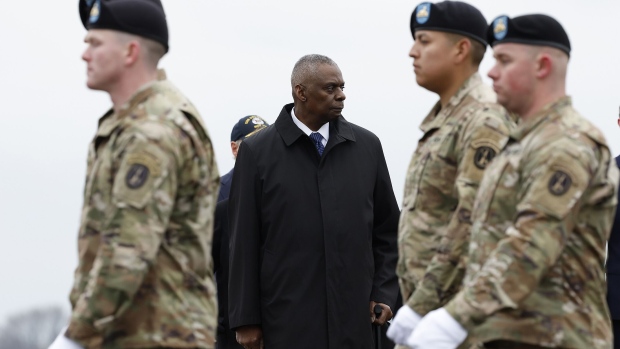Feb 4, 2024
US Promises More Mideast Strikes While Trying to Avert Wider War
, Bloomberg News

(Bloomberg) -- The US vowed more strikes against Iran’s forces and its proxies in the Middle East after three straight days of punishing attacks, even as Washington insisted it won’t be pulled into a prolonged regional conflict.
“We will respond forcefully, and we will respond in a sustained way,” White House National Security Advisor Jake Sullivan said on CBS. Even so, he said, President Joe Biden doesn’t see US actions in the last three days as “some open-ended military campaign.”
Balancing those two extremes will be Biden’s main challenge as he plots his next moves and braces for any counterattacks by Iran and its proxies as the fallout from the Israel-Hamas war worsens. Since that conflict began in October, the Middle East has been roiled by shipping attacks in the Red Sea and near-constant attacks on US bases in Syria and Iraq by Iran-backed groups.
Officials framed US strikes on Friday — which hit 85 targets in Iraq and Syria on Friday, including some by long-range bombers flown from the US — as a necessary and inevitable response to the killing of three US soldiers in a drone strike in Jordan a week ago.
“Yes,” Biden said when asked Sunday in Las Vegas whether the US attacks are working.
The strikes prompted sharp criticism from Russia and Iraq, as well as Iran. Iraq’s government said its territory shouldn’t be used for “settling scores” and warned of grave consequences for the wider region’s security.
The US is also targeting Iran-backed Houthi militants in Yemen, who have roiled global trade by targeting commercial vessels around the southern Red Sea. On Saturday and Sunday nights, American forces hit Houthi weapons-storage facilities deep underground.
The attacks in Yemen — and the expectation that the Pentagon will launch more strikes against Iranian assets and the country’s proxies in Iraq and Syria — suggested that the US was broadening the scope of its campaign. In an interview with CNN, Sullivan declined to rule out “any activity anywhere,” including in Iran itself.
The Friday night attacks in Syria and Iraq were “designed to navigate the course between demonstrating, both politically at home and in the region, that we have capacity and capability to strike them hard,” while ensuring there’s no broader escalation, said Aaron David Miller, a former senior State Department official who’s now at the Carnegie Endowment for International Peace.
One senior administration official, who asked not to be identified discussing private deliberations, insisted Biden won’t get dragged deeper into the Middle East conflicts. The official said the US assessment so far is that the strikes in Yemen, Iraq and Syria have been effective in degrading the groups’ capabilities and their ability to resupply their weapons.
US Central Command said its forces on Sunday conducted strikes in self-defense against at least five Houthi anti-ship cruise missiles “prepared to launch against ships in the Red Sea.” US forces also conducted a strike against a Houthi land-attack cruise missile, according to Centcom, which is in charge of American forces in the Middle East and parts of Asia.
For now, the group says it’s undaunted. Ali Al-Kahoum, a member of the Houthi political council, said there was an “open war” and that the group have the military capability to strike back. The Houthis have consistently said they won’t back down until Israel pulls out of Gaza.
How Iran-Backed Groups Provoke Wider Mideast Conflict: QuickTake
Even as the US contemplates more attacks, it’s pushing forward a deal — mediated by Qatar — that would see Israeli and Hamas halt the fighting that began with that militant group’s Oct. 7 attack in southern Israel. In return for an extended cease-fire, Hamas would agree to release most of the almost 140 hostages it still has under the deal, which the US believes is the only real way to defuse the regional crisis, according to one of the US officials.
Still, Sullivan on Sunday played down the chances of an imminent day.
Secretary of State Antony Blinken was headed back to the region Sunday evening on his fifth extended tour of the Middle East since the war broke out in October. He plans to meet leaders in Saudi Arabia, Egypt, Israel and Qatar to push for more progress on the talks and also shore up support for the US-led attacks.
Blinken does not see the strikes on the Iran-related targets as affecting chances for a deal providing for the release of Israelis held hostage by Hamas in tandem with a pause in the fighting in Gaza to allow for humanitarian aid to reach the area, a US official said.
Despite the criticism from Iraq, US officials said the international consensus is on their side. Most of Washington’s Arab allies in the Middle East are supportive of the US military response and recognize the US can’t tolerate attacks on its troops, according to one official from the region who asked not to be identified discussing the matter.
In Europe, though, there are reservations. After an informal gathering of foreign ministers in Brussels on Saturday, European Union foreign policy chief Josep Borrell said the ministers had expressed “serious concern” about the US airstrikes a day earlier.
“At any moment in this series of attacks and counter-attacks, a spark can create a greater incident,” Borrell said.
Former US officials and analysts said that the Biden team’s strategy — targeting Iran’s Quds force outside of the country’s borders as well as specific groups it said were responsible for attacks on US bases and shipping — seemed clearly designed to send a message without triggering an escalation that could see a direct conflict with Tehran.
The Quds force is part of Iran’s Islamic Revolutionary Guard Corps and responsible for handling many of Tehran’s relations with proxy groups.
Iran backs anti-Israel and anti-US groups across the region. Together, they are often called the “axis of resistance.” They include Hamas in Gaza and Hezbollah in Lebanon, as well as the Houthis and militias in Syria and Iraq.
For the US, “there’s an endgame objective of trying to punish Iran’s proxy forces while avoiding inflicting high costs on Iran directly — whether those are military, economic or political costs,” said Richard Goldberg, who served in former President Donald Trump’s National Security Council and is now a senior adviser at the Foundation for Defense of Democracies.
But, he said, “Iran has already escalated — and while it’s never easy putting a genie back in the bottle, the alternative is never-ending chaos, violence and distraction.”
--With assistance from Peter Martin, Jordan Fabian and Jon Herskovitz.
(Updates with latest comments from Middle Eastern leaders.)
©2024 Bloomberg L.P.








